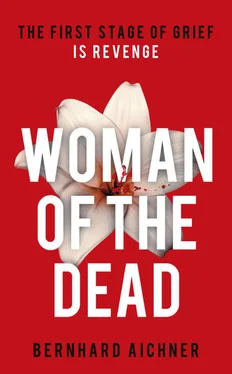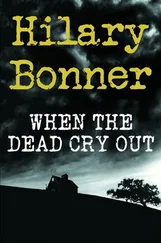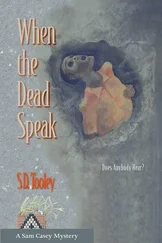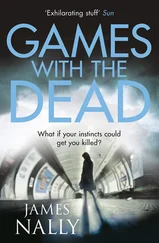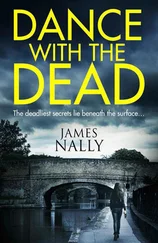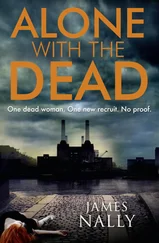‘Where are you? What’s the matter?’
‘I just wanted to hear your voice, Massimo.’
‘Are you in the car?’
‘It makes no difference where I am, does it?’
‘What’s the matter, Blum?’
‘Suppose something happens to me. What would happen to the children?’
‘What would happen to you?’
‘I might die.’
‘What the hell are you talking about?’
‘Mark’s dead. I might die too, and then the children would be on their own.’
‘You mustn’t think like that.’
‘But I do. And it frightens me.’
‘Well, stop.’
‘They’ll be put into a home.’
‘Stop talking like that. Nothing’s going to happen to you, I’ll look after you. Trust me.’
‘Do you remember the woman Mark was meeting?’
‘Yes. Why?’
‘She’s dead.’
‘What are you talking about?’
‘They pulled her out of the River Inn. I saw her in the forensics lab.’
‘How do you know it was her? You don’t know the woman.’
‘I saw a photo on Mark’s mobile. I know what she looked like. And she’s dead, Massimo. Drowned. They say it was either accident or suicide.’
‘Oh, Blum, you mustn’t let this weigh on your mind. It’s got nothing to do with you.’
‘It had something to do with Mark.’
‘But Mark is dead. You must stop this, Blum. The woman was homeless. She probably got drunk and fell into the river. Or she was tired of life and just wanted to end it all.’
‘I’m frightened, Massimo.’
‘Please don’t worry, Blum. I’ll look into the case, I promise. I’ll find out how she died. But you must promise you’ll stop thinking the worst.’
‘I promise.’
‘It will get better, Blum.’
‘It’s getting worse.’
‘Can I come and see you when the children go to bed?’
‘Yes.’
Blum ends the call. The thought of lying in his arms does make it better. The thought of telling him the truth is tempting. She would like to surrender herself, let him take control. Sure as she is that Massimo will never be more than a friend, she wishes he could be, wishes he could be like Mark to her. She wants to tell him everything about Dunya, Schönborn, Jaunig and Puch. She doesn’t want to be alone with it any more, lying in a lay-by. Massimo will come when the children are asleep. Or perhaps he will come sooner, if someone called the police, saying he saw Blum hit a man with a jack.
A child’s bike is under the apple tree. Nela is blowing bubbles. They float past Uma, who is asleep in her buggy. And here is Blum, parking the hearse behind the house and pushing the coffin into the preparation room. It is late summer and the scene in the garden is so ordinary. Karl is pruning the blackcurrant bushes, and Blum lifts Uma out of her buggy and kisses her awake. They run round the house, playing catch. Blum tries to forget the chef, to put off the inevitable. She’ll give herself two hours, then she’ll go back to the coffin, to the body of Bertl Puch.
What follows is routine, and that helps. It is easier to touch a corpse than to watch someone else do it. Blum swathes herself in plastic: her hands, her arms, her legs, her shoes. She doesn’t want to touch his blood or his flesh, she doesn’t want to touch any part of him. Blum prepares the hydroaspirator, saw, plastic bags and formalin. She calculates she will have him taken apart in three hours; she’d like to dispose of him more quickly than she did Schönborn. She wants to go back to the garden, play catch with the children and pretend everything is OK. Blum lifts him with the hoist and lowers him on to the preparation table. She cuts off the chef’s clothes, undresses him, rolls him on to his side and pulls the fabric away. She throws it all in the bin. His naked body looks innocent, his skin gives nothing away. There is nothing to show that he is a murderer and a rapist. He could have been a respectable husband and father. If Blum hadn’t known better, if she hadn’t seen the videos and talked to him, she would think he was blameless and regret what she had done. But she knows she was right. She is doing what has to be done.
She turns up the music. She sprays disinfectant to cover up the smell of shit. She opens his ribcage and takes out his organs, just as she did with Schönborn. She creates as little mess as she can, channelling the blood down the drain and not letting it lie on the floor. She divides and packs up his organs, just as the butcher would do when Hagen bought game. Then Herta would divide the meat into portions and freeze it. Roe deer, red deer, sometimes a calf too, a pig. Blum saws off Bertl Puch’s arms, then his legs. He is only flesh and bone. His limbs drop around her; she lets them fall to the floor and goes on sawing. She divides up his torso and separates his head from his neck. Just as his head drops off the table, the door opens.
The music was too loud. She didn’t hear him coming, she’d forgotten to bolt the door. No one should have seen this; no one should have witnessed the crime. Blum has made her next mistake; she has lost control again. She can’t forgive herself. Suppose it had been Nela standing in the doorway? Blum hadn’t been paying attention and now he is staring at her. It is a bloodbath, a disaster, a crime. Bertl Puch’s arms and legs and head are scattered on the floor. Blum would like the ground to swallow her up, she has no words, she just stands there, looking at him. Reza is taking in the scene, his eyes are circling the room, trying to make sense of it. Stepping forward, he closes the door and turns the key in the lock. Then he wraps himself in plastic without uttering a word. He puts on an apron and a pair of gloves. Reza is getting ready for work. He ignores the obvious fact that Blum would like to shut him out, he just carries on where she left off. He takes the saw out of her hand and finishes carving up Bertl Puch’s torso.
‘What are you doing, Reza?’
‘Shouldn’t I be asking you that question?’
‘Go on, then, ask.’
‘No.’
‘It’s complicated, Reza.’
‘It looks complicated. But we’ll get it done. You were going to pack these things up, weren’t you?’
‘Yes.’
‘And then bury them?’
‘Yes.’
‘We’ll have to put some of them in storage. There’s only one coffin here, it won’t all fit.’
‘No.’
‘Do you understand what I mean, Blum?’
‘Yes.’
‘Last time the coffins were too heavy.’
‘What?’
‘You overloaded them. The bearers noticed. I told them we were using a new model. A bigger coffin, more wood.’
‘You knew?’
‘I didn’t know.’
‘Did you open the coffins?’
‘No, I told you, they were too heavy.’
‘But you didn’t say a thing?’
‘No.’
‘It’s all messed up. Something’s … got out of control.’
‘You don’t have to explain yourself to me.’
‘I think I do.’
‘I’m sure you had your reasons.’
‘I did.’
‘Well, that’s good enough for me.’
‘Reza, go away and forget everything you’ve seen.’
‘No, we have to clean up now.’
‘I can explain it all.’
‘You don’t have to.’
‘Mark’s death. It wasn’t an accident.’
‘What do you mean?’
‘They killed him, Reza.’
‘Who did?’
‘This man. And four others. They ran him over, they took him away from us. They blew out the candle on the cake, just like that.’
Reza says nothing. He takes Bertl Puch’s right arm, puts it into a plastic bag, pours in some formalin and wraps it tightly. He fastens the package with sticky tape. Bertl Puch’s arm is almost vacuum-packed. Reza packs up his body piece by piece, while Blum starts at the very beginning. With the recorded conversations, with Dunya in the supermarket, Schönborn in the forest, Jaunig on the boat, Dunya in the forensics lab, the actor singing on the video, the man in the lay-by. She tells him the horror story, the nightmare from which she can’t wake. Now Reza is diving into the empty pool, hand in hand with her, to a count of three. She had no alternative. I’m here for you , he says, without pausing to think. There is no emotion on his face as he calmly wraps up the chef’s head. He is not afraid. He just gets on with it. He raises his hand, then hurls the head into the corner to join the other parts of Bertl Puch.
Читать дальше
